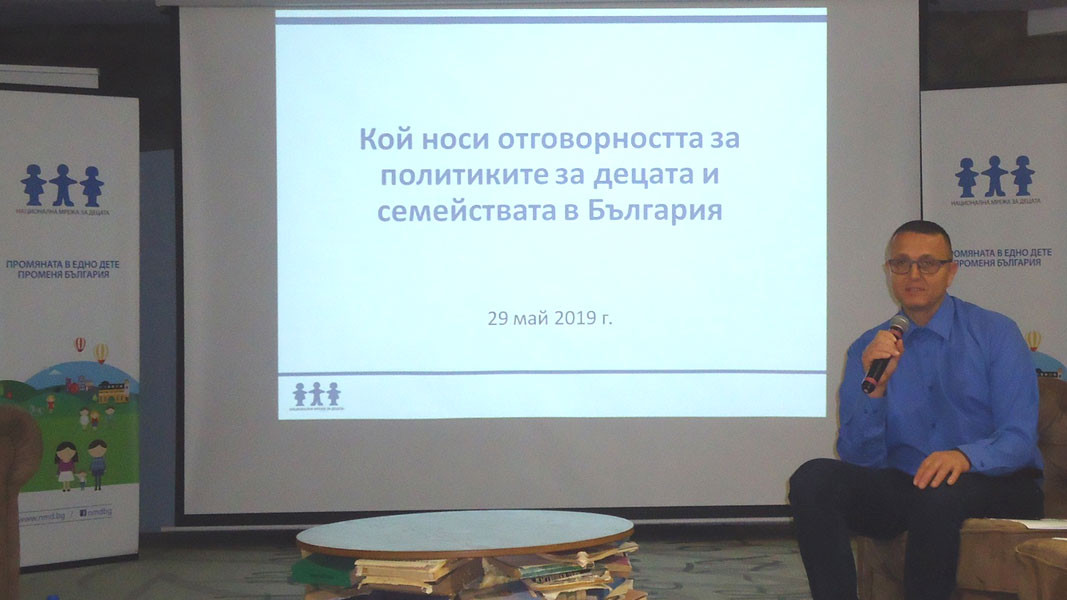The public confidence in the state institutions in terms of their child policies is extremely low. This is proven by the distrust in the National Strategy for the Child the Bulgarian cabinet had to withdraw recently. Opinions shared in the social networks made many Bulgarians believe that after the adoption of the proposed document, their children may be taken by the institutions even after a single slap.
In fact, this strategy is a mandatory document and is required by the Child Protection Act. It treats children as right holders for the first time and creates prerequisites for improving their quality of life. The draft of this document envisages access to healthcare to every pregnant woman, bans physical punishment, guarantees high-quality early education, child-friendly justice, gradual reduction of the number of children in the institutions until the complete closure of these social institutions, etc. However, these good intentions did not reach the society – not only because of the fake news, but also because of the flaccidity of the institutions.

Hybrid war and attacks against the human rights and the rights of the child are led not only in Bulgaria, but also in other European countries and on other continents, the Executive Director of the National Network for Children Georgi Bogdanov commented. We have been witnessing lower activity of the state to do useful things for our children and the people as a whole. It abandons policies which are meant to improve our lives. Bulgaria, just like the other countries, must have a long-term strategy for the children. This strategy must have a vision about the reforms which have to be made in healthcare, education and social services. If the state authorities do not explain clearly what this document actually is, what is the system for child protection and what its main purpose is, the people will easily succumb to insinuations published mainly in the social networks. The Bulgarians are susceptible to misinformation, because their media literacy is quite low.
What are the strengths of the strategy and what families will lose if it is not adopted?
For the first time, we have managed to focus on the family support. The child is not viewed outside the family environment as it was in the previous strategy, Georgi Bogdanov went on to say. The parents also receive assistance through patronage care, through topics on how the child can live better in the family environment and develop properly in the earliest childhood. Another topic concerns social services – they need stabilization, so that the social workers would avoid making the current mistakes. One of the most common mistakes is linked with the fact that the focus is only on the child, instead of the whole family.
The opponents of the document contend that it destroys the traditional Bulgarian family.
I do not know what is the traditional Bulgarian family – perhaps it is the family of the Middle-Ages when grandfathers told their daughters-in-law, their sons and all family members what to do, Georgi Bogdanov said. However, we now live in a completely different environment and there is no specificity behind this term. It is important for us to help the modern family raise their children better and deal with the difficulties related to their health, including their mental health. Currently, we have serious problems with alcoholism, drugs and violence in the family and we must help the modern families overcome these problems. As for slapping, the parents resort to this method from helplessness and fear, but the slap has never been an educational tool. It is only an expression of the helplessness of the parents.
Today, the National Network for Children which unites 152 organizations will give away their Golden Apple awards for contribution to the rights and the well-being of the children for the ninth time.
English version: Kostadin Atanasov
Romanian police and military personnel worked as mercenaries in Congo According to a report by the Romanian Ministry of the Interior, 11 of its employees worked as mercenaries in Congo while on sick leave, Digi24 reported. The Ministry..
Since its establishment on April 11, 2022, the Institute for Computer Science, Artificial Intelligence and Technology – INSAIT has achieved a number of successes and continues to position Bulgaria on the world's technological map...
Shortly after the opening of the motorcycle season in Sofia at the end of March, Bulgaria's capital city will host the country's largest motorcycle exhibition . The event takes place from today until April 14 at Arena 8888 Sofia . Between 700 and..
Shortly after the opening of the motorcycle season in Sofia at the end of March, Bulgaria's capital city will host the country's largest motorcycle..
Since its establishment on April 11, 2022, the Institute for Computer Science, Artificial Intelligence and Technology – INSAIT has..
Romanian police and military personnel worked as mercenaries in Congo According to a report by the Romanian Ministry of the Interior, 11..

+359 2 9336 661
